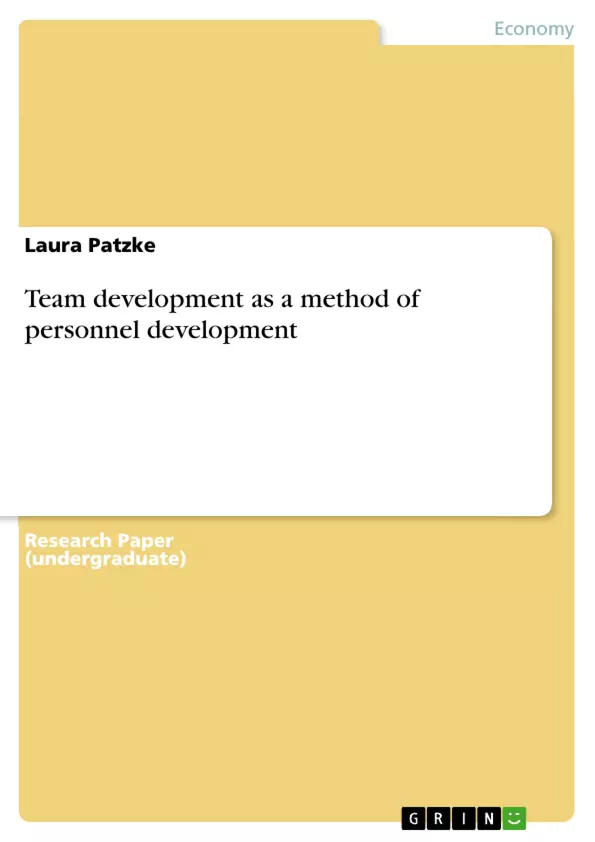Whether in private or professional life, as soon as people get together, groups can develop, sometimes on a voluntary basis, sometimes as a result of external pressure. These can be learning groups, classes, clubs, seminars, trainings or professional teams. This creates a dynamic, which in the best case, through structured team development, is specifically promoted and guided. Team development is the classic method of personnel development to accompany teams through individual phases so that they can work and learn effectively.
In the following, the terms "team" and "group" are first differentiated, a definition of team development is given, and the goals and methods of facilitation are explained. Subsequently, the individual phases of team development are theoretically presented according to the extended Tuckman model. After the explanation of the theoretical methods and phases, these are presented on the basis of a personal experience, in which it is about a training group in the field of integrative-systemic coaching. The goal of the members is to receive a certificate as a trained coach at the end of this training.
By "being dependent on each other", as the methods have to be practiced among the members themselves, particularly lively and at the same time dependent relationships are created among each other. All this is guided by a teacher who also holds the position of coach/facilitator at the same time. The interpretation of the different phases in relation to the training group is followed by the assignment of the individual group members to the team roles according to Belbin.
Inhaltsverzeichnis (Table of Contents)
- Introduction
- Theoretical part
- Demarcation of the term team from group
- Definition of team development as a measure of personnel development
- Moderation in the context of a team development
- Objectives of moderation
- Methods of moderation
- Phases of team development according to the extended Tuckman model
- Forming
- Storming
- Norming
- Performing
- Re-forming
- Practical part
- Case presentation
- The situation
- The parties involved
- Interpretation
- The phases after Tuckman and occurring complications
- Classification of team roles according to Beibin
- Case presentation
Zielsetzung und Themenschwerpunkte (Objectives and Key Themes)
This text aims to provide a comprehensive understanding of team development within the context of personnel development. It explores the dynamics of teams, their differentiation from groups, and the process of guiding teams through various developmental stages. The text also examines the role of moderation in facilitating team development and discusses specific methods and phases of this process.
- Team development as a crucial aspect of personnel development
- Distinguishing between teams and groups
- The importance of moderation in team development
- The phases of team development according to the extended Tuckman model
- Applying team development concepts to a real-world case study
Zusammenfassung der Kapitel (Chapter Summaries)
The introductory chapter sets the stage by defining the context of teams and groups in both personal and professional settings. It highlights the significance of team development as a method to guide and promote effective teamwork. The theoretical part delves into the differentiation between teams and groups, defining team development as a personnel development tool. It emphasizes the importance of moderation in fostering team growth and outlines the objectives and methods of effective moderation. This section also introduces the extended Tuckman model, outlining the different phases of team development.
The practical part presents a case study involving a training group in the field of integrative/systemic coaching. The chapter analyzes the dynamics of this group, applying the theoretical framework of team development and Tuckman's model to interpret the group's progression through various phases. It also explores the classification of team roles according to Belbin, providing insights into the individual contributions of members within the group.
Schlüsselwörter (Keywords)
The text focuses on key concepts such as team development, personnel development, moderation, Tuckman model, team roles, group dynamics, and case study. These concepts are explored within the context of a training group, highlighting the application of theoretical frameworks to real-world scenarios. The text emphasizes the importance of effective communication, leadership, and collaboration for successful team development.
Frequently Asked Questions
What is the difference between a team and a group?
A group is a collection of individuals, while a team is a specific type of group that is dependent on each other to achieve a common goal, often with shared accountability.
What are the phases of team development according to Tuckman?
The model includes five phases: Forming (orientation), Storming (conflict), Norming (structuring), Performing (efficiency), and Re-forming (dissolution or change).
What are Belbin's team roles?
Belbin identified specific roles that members take within a team (e.g., Shaper, Implementer, Completer Finisher) to ensure all necessary functions for success are covered.
What is the role of a moderator in team development?
A moderator guides the team through developmental phases, facilitates communication, and helps resolve conflicts to reach the "performing" stage effectively.
How is team development applied in coaching training?
The text uses a case study of a coaching training group where members practice methods on each other, creating intense interdependencies and specific group dynamics.
- Quote paper
- Laura Patzke (Author), 2013, Team development as a method of personnel development, Munich, GRIN Verlag, https://www.grin.com/document/1170837



